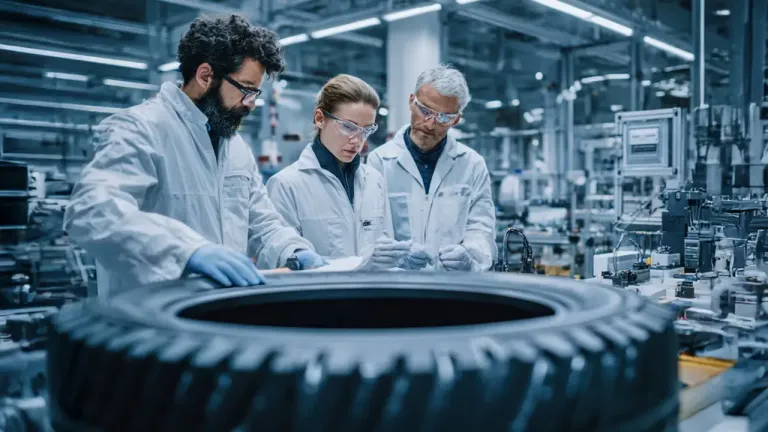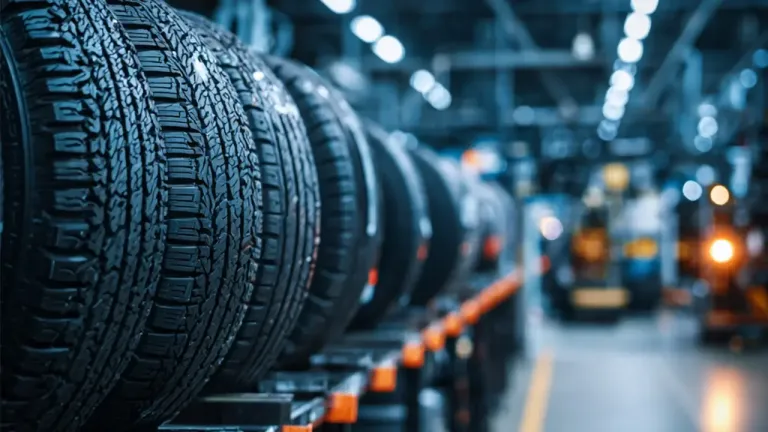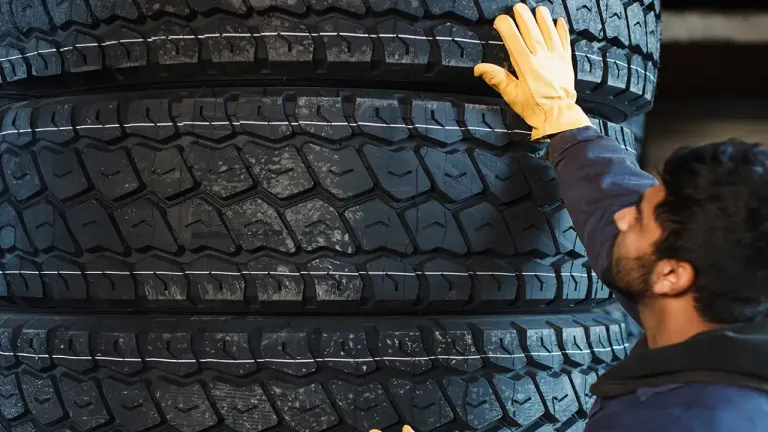Tire Manufacturers
Learn how industry leaders are overcoming rising fuel and raw material costs, fierce competition, and stringent safety and environmental regulations to develop more sustainable tires
Transforming Tire Manufacturing with Innovation
Tire manufacturers face growing demand for performance, personalization and sustainability. Dassault Systèmes empowers them with end-to-end virtual twin technologies — from design to after-sales services — to accelerate innovation and improve operational excellence
Key Challenges in Tire Manufacturing
- Fragmentation Between Core Functions
- Demand for Customization
- Safety and Environmental Regulations
- Performance and Sustainability
- Green Mobility and Sustainable Tires
Fragmentation Between Core Functions
One of the most pressing challenges facing the tire industry today is the persistent fragmentation between core functions — research and development (R&D), production, quality, and supply chain. Despite technological advancements, many of these departments still operate in isolation, relying on disconnected data systems and limited cross-functional collaboration.
This lack of integration is more than a workflow issue. It directly impacts time to market, quality consistency and responsiveness to customer demand. When communication fails, decision-making slows. When data isn’t shared in real time, errors multiply. And when teams pursue conflicting priorities — innovation, cost, efficiency and sustainability — the result is often misalignment, rework and waste.
Nowhere is this more critical than in the development of new materials and tire compounds. Without synchronized input from manufacturing and supply chain early in the process, innovation can stall in the transition from lab to factory floor. The costs are significant: Missed launch windows, higher scrap rates and an inability to scale quickly.
Demand for Customization
Global demand for tires is on the rise, fueled by the continued growth of commercial and passenger vehicles on the roads. This is especially true in fast-expanding markets across Asia. But it’s not just about volume. The nature of demand is evolving rapidly.
Today’s automotive landscape is shaped by major trends such as CASE (Connected, Autonomous, Shared and Electric mobility) and a shift from product ownership to ride-sharing. Vehicle platforms are becoming more diverse as a result, requiring unique tire designs, materials and performance characteristics. Consumers and Original Equipment Manufacturers (OEMs) are looking for premium, specialty and sustainable tire options tailored to increasingly specific needs.
This shift eliminates the possibility of relying on a standardized set of common tire sizes. Instead, tire manufacturers must now manage broader product portfolios with more SKUs, smaller batch sizes and shorter production runs.
At the same time, manufacturers must navigate seasonal volatility. For instance, growing awareness around road safety continues to drive demand for winter tires, requiring fast and precise adjustments to production as weather conditions shift.
In this high-pressure environment, agility and scalability are mission-critical. Manufacturers must be able to accelerate product development, adapt production dynamically and support mass customization, all while meeting sustainability targets and cost efficiency goals.
Success depends on the ability to manage complexity without compromising speed, quality, or innovation.
Safety and Environmental Regulations
Tire manufacturers are entering a new era of regulatory pressure as global authorities introduce stricter safety and sustainability standards. Emissions targets, raw material restrictions and evolving performance requirements are forcing a fundamental shift in how tires are designed and produced.
For the first time, tire abrasion will be regulated under the Euro 7 framework to limit the release of pollutants and microplastics into the environment. This adds a new layer of complexity to an already demanding compliance landscape where manufacturers must also meet strict criteria for wet grip, rolling resistance, and rolling noise. The challenge? Delivering on these expanding requirements without compromising performance, cost or innovation.
To succeed, tire manufacturers must accelerate the adoption of sustainable and alternative materials, while engineering tires that are more durable and efficient. Balancing durability with fuel efficiency and safety is no longer a future ambition, but a current necessity.
As sustainability becomes a competitive differentiator, those who can adapt quickly and intelligently to regulatory change will lead the next generation of tire innovation.
Performance and Sustainability
The tire industry stands at a pivotal moment where sustainability and performance must go hand in hand. Manufacturers are increasingly adopting innovative designs and exploring alternative materials to meet environmental and market demands. Those who can successfully balance these imperatives will not only help shape the future of tire manufacturing but also drive a new era of eco-conscious mobility — delivering products that are safer, more efficient, and more sustainable.
The average tire is made up of over 200 components, including a mix of natural rubber, plastics, carbon black (derived from crude oil) and chemicals like 6PPD which helps prevent cracking. These materials work together to determine a tire’s key attributes, representing a delicate balance of material science, design and engineering, and manufacturing. It's this chemistry and physics that ultimately defines the tire’s safety, performance and environmental impact.
Currently, a significant portion of tire composition consists of toxic chemicals and petroleum-based synthetic rubber. As concerns over sustainability and raw material costs grow, manufacturers are under increasing pressure to find sustainable, cost-effective alternatives.
Innovative new tire designs are emerging to address these challenges. By reducing material usage and maximizing performance, manufacturers aim to conserve resources, improve fuel efficiency, and reduce their environmental footprint.
Green Mobility and Sustainable Tires
There is now intensified scrutiny on the materials and processes used to produce tires so as not to undermine the green credentials of electric vehicles on the roads. Tire manufacturers must consider raw material usage, greener alternatives to carbon black and 6PPD, recyclability and durability from the design concept stage. They must also monitor their carbon footprint and maintain traceability throughout the product development cycle.
Projects centered on the circular economy, extending tire lifespans, and recovering and reusing materials from old tires are on the rise as tire manufacturers step up their sustainability efforts. Data-driven product development gives manufacturers the insights they need to incorporate more sustainable materials into their tires without compromising on performance.
Transforming the Business of Tire Manufacturing
Our Solutions for Tires Manufacturers
Reduced Time To Market
The 3DEXPERIENCE platform helps manufacturers streamline the entire development cycle from concept to production — and bring their products
Enhanced Product Quality
End-to-end integration fosters real-time collaboration, simplifies the development of complex tire designs, ensures consistency in manufacturing and enhances transparency, quality and traceability.
Operational Cost Optimization
With the SmarTyre solution , manufacturers can optimize production processes in real time by enhancing material sourcing, improving production planning and increasing yield
Digital Continuity
SmarTyre enables advanced simulations and virtual prototyping during design. SmarTyre also provides performance insights as tires enter service,
Increased Innovation Capacity
Advanced multiphysics simulation reduces the dependency on lengthy and costly prototypes, speeding up product development and industrialization.
Embracing the Circular Economy
An integrated digital approach to tire engineering can drive the creation of green tires. Manufacturers can design tires that support sustainabilivty at every stage of their lifecycle.
Virtual Twin Technology and Tire Manufacturing
In order to be efficient, developing new materials and tire designs needs to be done globally. However, leveraging local assets to produce as close as possible to the end customer is crucial. Glocal operations (a combination of global development and local manufacturing) are key to meeting this challenge. By connecting both worlds and ensuring continuity along the bill of materials (BOMs) and processes, industrialization becomes streamlined and more efficient.
Virtual twin technology, powered by the 3DEXPERIENCE platform, enables tire manufacturers to simulate real-world performance, verify designs early and replicate entire production systems.
Combined with material industrialization, manufacturers can accelerate the development of innovative materials, optimize formulations and scale production with global and local alignment. This integrated approach helps leading tire manufacturers reduce risks, speed up decision-making, and optimize tire design and manufacturing processes.
By leveraging the virtual twin and the 3DEXPERIENCE platform, manufacturers gain the ability to:
Optimize Performance
by finding the best balance between wear, fuel efficiency and grip
Create Smart, Connected Tires
that enable automatic wear monitoring and enable new business models like Tire as a Service (TaaS)
Manage Product Complexity
through modular tire design, allowing for efficient scaling and customization of product ranges
Increase Operational Margins
by finding the best balance between wear, fuel efficiency and grip.
Precision-Driven Innovation in the Tire Industry
The 3DEXPERIENCE® platform accelerates innovation in the tire industry, especially in material science and virtual prototyping, helping manufacturers gain up to 25% time to market.
Success Stories of Tire Makers
Tire Manufacturing: Frequently Asked Questions
Explore our Industry Solution Experiences
Learn how our Industrial Equipment solutions can transform your business and enhance profitability





